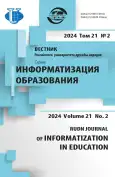Применение средств анимации в медиапространстве акции «Библионочь» для развития навыков командной работы обучающихся магистратуры
- Авторы: Мамаева Е.А.1, Грибков Д.Н.2, Матвеев В.В.2, Машарова Т.В.3
-
Учреждения:
- Вятский государственный университет
- Орловский государственный институт культуры
- Московский городской педагогический университет
- Выпуск: Том 21, № 2 (2024)
- Страницы: 209-226
- Раздел: ВЛИЯНИЕ ТЕХНОЛОГИЙ НА РАЗВИТИЕ ОБРАЗОВАНИЯ
- URL: https://journal-vniispk.ru/2312-8631/article/view/321368
- DOI: https://doi.org/10.22363/2312-8631-2024-21-2-209-226
- EDN: https://elibrary.ru/NRCWKR
- ID: 321368
Цитировать
Полный текст
Аннотация
Постановка проблемы. Модернизация современного библиотечного образования предполагает умения применять средства информатизации, в частности компьютерной анимации, в работе над проектами и навыки командной работы. Их сформированность во много определяет профессиональную самореализацию многофункциональных специалистов библиотечного дела. Исследование направлено на обоснование эффективности использования средств анимации в медиапространстве акции «Библионочь» для развития навыков командной работы обучающихся магистратуры. Методология. Применяется теоретико-методологический анализ и обобщение при определении содержания и проблем развития навыков командной работы в библиотечно-информационном образовании, включения средств анимации в реализацию медиапроектов. Для разработки дидактической анимации используется платформа Renderforest. В исследовании задействовано 68 магистрантов Орловского государственного института культуры. Изучение средств анимации и применение их для проектирования медиапространства библиотеки реализовано в рамках занятий дисциплины «Информационные технологии в науке и образовании». Для оценки сформированности навыков командной работы обучающихся магистратуры использована методика В. Стефансона. С ее помощью определены уровни их развития, взаимосвязанные с качествами личности. Для статистической обработки применены критерий хи-квадрат Пирсона и метод Фишера (угловое преобразование). Результаты . Сформулированы идеи методического подхода, отражающего необходимые изменения в системе подготовки специалистов библиотечного дела с учетом цифровизации библиотечно-информационного обслуживания. Уточнен дидактический потенциал средств анимации для повышения качества библиотечного образования, в частности для развития навыков командной работы магистрантов: умений прислушиваться к альтернативному мнению других членов команды, принимать стандарты и ценности группы, следовать социальным и морально-этическим нормам коллектива. Определены статистически достоверные различия в качественных изменениях, произошедших в дидактической системе. Заключение . Использование средств анимации в медиапространстве акции «Библионочь» способствует формированию навыков командной работы обучающихся магистратуры: новые возможности коллаборации и проектной деятельности, инновационный опыт работы и т. д. Однако существуют факторы, осложняющие процесс командообразования в медиапространстве библиотек: отсутствие четкого лидерства в библиотеке, недостаток коммуникации между сотрудниками, слабая мотивация, низкий социальный статус профессии.
Об авторах
Екатерина Александровна Мамаева
Вятский государственный университет
Автор, ответственный за переписку.
Email: mamaevakathy@gmail.com
ORCID iD: 0000-0002-7721-8820
старший преподаватель, кафедра цифровых технологий в образовании
Российская Федерация, 610000, Киров, ул. Московская, д. 36Дмитрий Николаевич Грибков
Орловский государственный институт культуры
Email: bibliotekar2005@mail.ru
ORCID iD: 0000-0002-3388-9526
кандидат педагогических наук, доцент, заведующий кафедрой информатики и документоведения
Российская Федерация, 302020, Орел, ул. Лескова, д. 15Владимир Владимирович Матвеев
Орловский государственный институт культуры
Email: rector@ogik.ru
ORCID iD: 0000-0003-2906-5716
доктор экономических наук, профессор, ректор
Российская Федерация, 302020, Орел, ул. Лескова, д. 15Татьяна Викторовна Машарова
Московский городской педагогический университет
Email: mtv203@mail.ru
ORCID iD: 0000-0001-5974-7748
доктор педагогических наук, профессор, профессор департамента педагогики, Институт педагогики и психологии образования
Российская Федерация, 129226, Москва, 2-й Сельскохозяйственный пр-д, д. 4Список литературы
- Zheng X, Lang A, Ewoldsen DR. The measurement of positive and negative affect in media research. Routledge; 2021. p. 48-66. http://doi.org/4324/9780429465758-4
- Gendina NI, Kosolapova EV, Rodionova DD, Ryabtseva LN. Digitalization of museums and the need to form an information culture of museologists. Tomsk State University Journal of Cultural Studies and Art History. 2021;43:231-221. (In Russ.) http://doi.org/10.17223/22220836/43/19
- Dolgireva A, Balina T, Levitskaya A. Multimedia Brochure Taganrog - the Cultural Capital of the Don (Virtual Open-air Museum). International Journal of Media and Information Literacy. 2022;7(1):48-59. http://doi.org/10.13187/ijmil.2022.1.48
- Mikhalchuk NE. The library QR-projects in digital space. Scientific and Technical Libraries. 2021;9:91-102. http://doi.org/10.33186/1027-3689-2021-91-102
- Onunga J. Applications of information communication technology (ICT) in academic libraries: an overview of Turkana University College Library. Open Journal for Information Technology. 2021;4:35-40. http://doi.org/10.32591/coas.ojit.0402.01035o
- Bender SM. Coexistence and creativity: screen media education in the age of artificial intelligence content generators. Media Practice and Education. 2023;24(1):1-16. http://doi.org/10.1080/25741136.2023.2204203
- Grakova EV, Maslakova MV, Dolganova TG. Value orientations of generations of employees and library organizational culture. Knowledge. Understanding. Skill. 2020;(2):136-145. (In Russ.) http://doi.org/10.17805/zpu.2020.2.12
- Gendina NI. Media education in the library sphere: the basis for implementing of the new direction of training and learning media and information literacy of citizens in the library. Media. Information. Communication. 2017;(21):1-10. EDN SFCTED. (In Russ.)
- Belyaeva NE, Esipov AL. Library education in the context of digitalization. Bulletin of the St. Petersburg State Institute of Culture. 2023;(2):143-149. (In Russ.) http://doi.org/10.30725/2619-0303-2023-2-143-149
- Redkina NS. Digital competencies of librarians in the ecosystem of Open Science. Bibliosphere. 2023;(2):25-34. (In Russ.) http://doi.org/10.20913/1815-3186-2023-2-25-34
- Saratovtseva N, Kozlova O, Vaganova O, Chernei O, Smirnova Zh. Formation of bachelors’ competence readiness to work in a team. Propósitos y Representaciones. 2021;9(SPE1):e807. http://doi.org/10.20511/pyr2021.v9nSPE1.807
- Salynina SU. Innovative practices in animation activities of institutions for additional education for children. International Research Journal. 2023;(11):1-5. (In Russ.) http://doi.org/10.23670/IRJ.2023.137.92
- Sukiasyan ER. Library magistrature. Its impact on the fate of library education in Russia. Scientific and Technical Libraries. 2017;(10):69-80. EDN ZKAOBT. Сукиасян Э.Р. Библиотечная магистратура и судьба библиотечного образования в России // Научные и технические библиотеки. 2017. № 10. С. 69-80. https://doi.org/10.33186/1027-3689-2017-10-69-80
- Pagore RB, Singh UK. Role of ICT in developing skills among library professionals with respect to digitalization of selected colleges and universities in Maharashtra. IP Indian Journal of Library Science and Information Technology. 2022;7(2):75-80. http://doi.org/10.18231/j.ijlsit.2022.014
- Tunay M. A new approach model of e-visual career application in distance education. American Journal of Science & Engineering. 2020;1:9-15. http://doi.org/10.15864/ajse.1402
Дополнительные файлы









